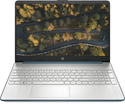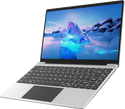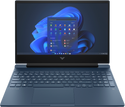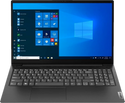A comparison of specs, key information, reviews, and best pricing from top retailers
Last updated -- hours ago | Report incorrect information
What we think

The PerfectRec laptop team Learn more
Updated January 10, 2024·
If you require a laptop for general use with a tighter budget, the ASUS Vivobook Go 15 is an economical choice, but it comes with a basic screen and performance suitable for tasks like web browsing, document editing, and light multitasking. In contrast, the ASUS Zenbook 14X OLED is more expensive but offers a high-quality OLED touchscreen, superior performance for 3D rendering, machine learning, and engineering applications, and is highly portable with a better battery life. It is also equipped with a better keyboard, webcam, and speakers, making it well-suited for users who need more power and visual quality for professional or creative work. Give Feedback
this description is based on the product variant with some specs and product variant with some specs. At the time of writing, the variant with some specs cost some dollars and the variant with some specs cost some dollars.
Advantages of the ASUS Vivobook Go 15
- The ASUS Vivobook Go 15 has no clear advantages over the ASUS Zenbook 14X OLED.
Advantages of the ASUS Zenbook 14X OLED
- Good for general use
- Good for engineering and design
- Good for software development
- Good for content creation
- Very good overall display quality
- Very good portability
- Good speakers
- Very good keyboard
Key differences
General Use
5.6

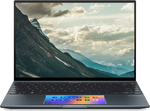
7.5
1920 x 1080
RESOLUTION
2880 x 1800
TN
DISPLAY TECHNOLOGY
OLED
200.0 nits
DISPLAY BRIGHTNESS
376.0 nits
7.0 Hours
BATTERY LIFE
6.0 Hours
6.7/10
KEYBOARD QUALITY SCORE
8.0/10
7.9/10
PORTABILITY SCORE
8.3/10
The ASUS Zenbook 14X OLED is good for general use, while the ASUS Vivobook Go 15 is poor.
The ASUS Vivobook Go 15 has a less powerful Intel Celeron processor and only 4GB of RAM, which can hinder performance in general use, while its TN screen offers poorer color and viewing angles compared to the ASUS Zenbook 14X OLED's high-resolution OLED display, which also benefits from a more capable Intel i5 processor and double the RAM at 8GB, leading to smoother overall performance and better multitasking capabilities. Additionally, the Zenbook 14X boasts a more premium build, with better portability due to a slightly lighter weight and superior battery life, alongside a better keyboard and higher-quality speakers, making it a more suitable choice for general use.
Gaming and AI
5.5


6.5
3.5/10
OVERALL GPU SCORE
3.7/10
1920 x 1080
RESOLUTION
2880 x 1800
60Hz
REFRESH RATE
120Hz
No
SUPPORTS DLSS
No
No
MUX SWITCH / ADVANCED OPTIMUS
No
7.5/10
FAN NOISE SCORE
6.5/10
The ASUS Zenbook 14X OLED is only fair for gaming and AI, while the ASUS Vivobook Go 15 is poor.
PerfectRec’s Gaming and AI Score strongly emphasizes graphics processing capability, while also taking into account other factors that impact suitability for gaming and AI work.
Engineering and Design
5.4


7.7
3.3/10
OVERALL CPU SCORE
8.5/10
3.5/10
OVERALL GPU SCORE
3.7/10
4.0 GB
RAM
8.0 GB
The ASUS Zenbook 14X OLED is good for engineering and design, while the ASUS Vivobook Go 15 is poor.
The ASUS Vivobook Go 15, with its basic Intel Celeron processor, limited RAM, and standard screen resolution, is not well-suited for demanding engineering and design work, whereas the ASUS Zenbook 14X OLED offers a more powerful Intel i5 processor, double the RAM, and a superior OLED screen with higher resolution, all of which are better for such tasks. Despite the Zenbook's higher capabilities, it maintains similar portability to the Vivobook, but the improvements in screen quality and performance come at the expense of a higher price.
Content Creation
5.7


7.6
3.3/10
OVERALL CPU SCORE
8.5/10
1920 x 1080
RESOLUTION
2880 x 1800
4.0 GB
RAM
8.0 GB
TN
DISPLAY TECHNOLOGY
OLED
The ASUS Zenbook 14X OLED is good for content creation, while the ASUS Vivobook Go 15 is poor.
PerfectRec’s Content Creation Score takes into account the many different features of the laptop that make it more or less suitable for photo editing, video editing and other content creation tasks.
Software Development
5.9


7.5
3.3/10
OVERALL CPU SCORE
8.5/10
4.0 GB
RAM
8.0 GB
1920 x 1080
RESOLUTION
2880 x 1800
6.7/10
KEYBOARD QUALITY SCORE
8.0/10
The ASUS Zenbook 14X OLED is good for software development, while the ASUS Vivobook Go 15 is poor.
PerfectRec’s Software Development Score takes into account the many different features of the laptop that make it more or less suitable for software developers.
Screen Quality
5.2


8.6
15.6in
SIZE
14.0in
1920 x 1080
RESOLUTION
2880 x 1800
TN
DISPLAY TECHNOLOGY
OLED
60Hz
REFRESH RATE
120Hz
200.0 nits
BRIGHTNESS
376.0 nits
The ASUS Zenbook 14X OLED has a better screen than the ASUS Vivobook Go 15 for general use, gaming and AI, engineering and design, content creation, and software development.
The ASUS Vivobook Go 15's inferior screen quality stems from its basic panel type, lower resolution, and limited brightness, which compromise clarity and vibrancy for everyday usage. The ASUS Zenbook 14X OLED boasts a high-quality OLED display, offering excellent resolution and color accuracy vital for engineering and design tasks, ensuring precise color representation. However, for gaming and 3D applications, both laptops fall short due to their screens' lower refresh rates, which can affect smoothness and responsiveness during high-speed graphics rendering.
Build Quality
7.0


7.8
The ASUS Zenbook 14X OLED and ASUS Vivobook Go 15 both have good build quality, though the ASUS Zenbook 14X OLED has somewhat better build quality.
PerfectRec’s Build Quality Score incorporates case materials, display and keyboard flex, hinge quality, and overall reliability.
Cost
$240


$575
$0
$200
$400
$600
$800
$1,000
The ASUS Vivobook Go 15 has a price of $240 and the ASUS Zenbook 14X OLED costs $575.

Let Us Help Find Your Perfect Laptop
Find your new laptop
Key similarities
Battery
7.0 Hours


6.0 Hours
The ASUS Vivobook Go 15 has 7 hours of battery life. The ASUS Zenbook 14X OLED has 6 hours of battery life.
Battery life estimate is based on a mix of common use patterns. More portable and higher performing laptops tend to have less battery life.
Portability
Good


Very Good
15.6in
SIZE
14.0in
3.4 lbs
WEIGHT
3.4 lbs
0.7in
THICKNESS
0.6in
Although they have very similar scores, PerfectRec considers ASUS Zenbook 14X OLED to have very good portability, while the ASUS Vivobook Go 15 has good portability.
The most portable laptops are small, thin, and light.
Give feedback
We’re constantly working to improve.
How the ASUS Vivobook Go 15 and the ASUS Zenbook 14X OLED compare to other laptops
Spec Comparison
| ASUS Vivobook Go 15 | ASUS Zenbook 14X OLED |
GENERAL | |||
|---|---|---|---|
| Price | |||
$240 | $575 | ||
Release Date | |||
Release Date | February 1, 2022 | May 1, 2023 | |
Overall Dimensions | |||
Overall Dimensions | 14.2'' x 9.3'' x 0.71'' | 12.7'' x 8.9'' x 0.67'' | |
Weight | |||
Weight | 3.46 lbs | 3.44 lbs | |
Width | |||
Width | 14.18" | 12.67" | |
Depth | |||
Depth | 9.31" | 8.88" | |
INTERNAL | |||
|---|---|---|---|
Processor | |||
Processor | Intel Celeron N4020 | Intel i5-13500H | |
RAM | |||
RAM | 4 GB | 8 GB | |
DDR Memory Version | |||
DDR Memory Version | 4 | 5 | |
RAM Slots | |||
RAM Slots | 0 | 0 | |
Storage | |||
Storage | 64 GB | 512 GB | |
BATTERY | |||
|---|---|---|---|
Battery Life | |||
Battery Life | 7 Hours | 6 Hours | |
Battery Capacity | |||
Battery Capacity | 42 Wh | 70 Wh | |
SCREEN | |||
|---|---|---|---|
Diagonal Size | |||
Diagonal Size | 15.6" | 14" | |
Display Technology | |||
Display Technology | TN | OLED | |
Resolution | |||
Resolution | 1920 x 1080 | 2880 x 1800 | |
Refresh Rate | |||
Refresh Rate | 60Hz | 120Hz | |
Display Brightness | |||
Display Brightness | 200 nits | 376 nits | |
RELIABILITY, APPEARANCE & ACOUSTICS | |||
|---|---|---|---|
Build Quality Score | |||
Build Quality Score | 7/10 | 7.8/10 | |
Portability Score | |||
Portability Score | 7.9/10 | 8.3/10 | |
Gaming Laptop Appearance | |||
Gaming Laptop Appearance | No | No | |
Premium Business Laptop | |||
Premium Business Laptop | No | No | |
Fan Noise Score | |||
Fan Noise Score | 7.5/10 | 6.5/10 | |
HARDWARE FEATURES | |||
|---|---|---|---|
Keyboard Quality Score | |||
Keyboard Quality Score | 6.8/10 | 8/10 | |
Speaker Quality Score | |||
Speaker Quality Score | 6/10 | 7.5/10 | |
Webcam | |||
Webcam | 480p | 1080p | |
Fingerprint Reader | |||
Fingerprint Reader | No | No | |
Backlit Keyboard | |||
Backlit Keyboard | No | Yes | |
Number Pad | |||
Number Pad | Yes | Yes | |
CONNECTIVITY | |||
|---|---|---|---|
USB Type-A | |||
USB Type-A | 2 | 1 | |
USB-C ports | |||
USB-C ports | 1 | 2 | |
USB-C Charging | |||
USB-C Charging | No | Yes | |
Display Outputs | |||
Display Outputs | 1 | 3 | |
Thunderbolt Version | |||
Thunderbolt Version | N/A | 4 | |
Shopping
ASUS Vivobook Go 15
See more
Dig into reviews and images
Trusted Reviews
Josh Brown | January 2024
"The Asus Vivobook Go 15 is a good option if you’re looking for one device to tackle a bunch of smaller problems. For simple school studies, portable evening entertainment or distractions, and getting household admin or light office workloads out of the way, it’s a great little package with respectable battery life, and a great contender for the advent of cloud gaming."
ASUS Zenbook 14X OLED
See more
Dig into reviews and images
PCMag
Matthew Buzzi | September 2023
"While one of the more budget-friendly configurations of the Asus Zenbook 14X OLED may make a compelling case as a top value pick, it’s difficult to be disappointed with the more expensive model we reviewed here. At its core, for all models, it’s a luxury-built laptop with extreme portability and a gorgeous OLED display. Our unit rocks with a snappy Core i9 processor for getting real work done, and the discrete GPU—even if it has a clear power ceiling—is a bonus for creative pros."
Get a great deal on the ASUS Vivobook Go 15 or the ASUS Zenbook 14X OLED
About ASUS
ASUS, a Taiwanese electronics brand, is one of the largest personal computer vendor by market share. The majority of their laptops are targeted towards personal use or gaming. Their most popular product lines include the budget-friendly VivoBook, more premium ZenBook, and their TUF and ROG gaming laptops, the latter of which has a reputation for excellent gaming performance.
Give feedback
We're constantly perfecting our model
Laptop guides you might be interested in
More comparisons for you
FAQs
FAQs about laptops
Why trust us
This information was produced and vetted by the PerfectRec laptops team. We are a product research and recommendation organization that meticulously reviews and evaluates the latest laptop information and makes it digestible for you.
By the numbers
380
Laptops evaluated
48,640
Laptops stats compiled
13
Proprietary Laptops ratings developed
172,395
Recommendations made
37,353
Consumer hours saved
About the laptop team
Joe Golden, Ph.D
CEO and Laptops Editor
Joe is an entrepreneur and lifelong electronics enthusiast with a Ph.D in Economics from the University of Michigan.
Jason Lew
Staff Expert & Software Engineer
Jason is a staff expert and software engineer that has been making laptop recommendations for 7 years and moderates one of the largest laptop subreddits.
Chandradeep Chowdhury
Staff Expert & Software Engineer
Chandradeep is a staff expert and software engineer and expert in televisions and monitors. He’s been making monitor recommendations for ten years.
Craig Russell
Laptops Expert
Craig is a UK-based laptops expert. Craig works in IT, where he recommends and supports laptops and PCs for clients and has been recommending laptops on Reddit for five years.



